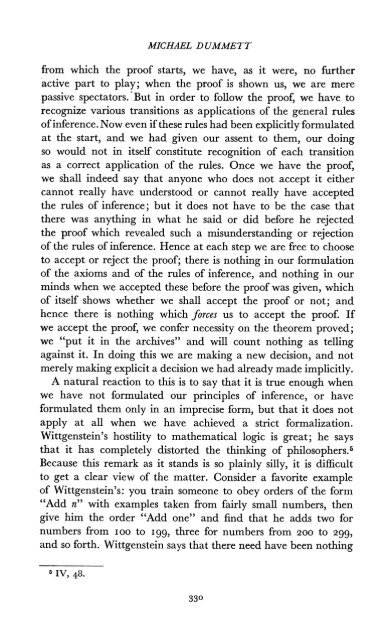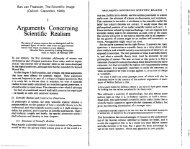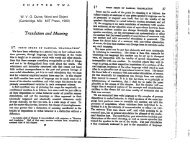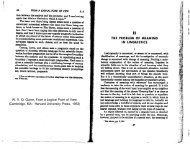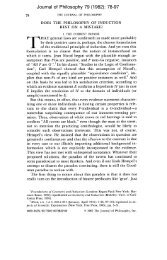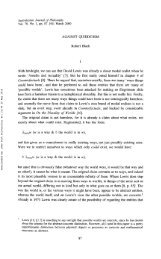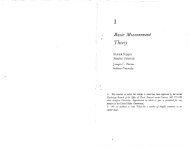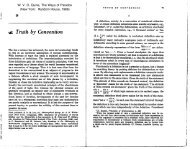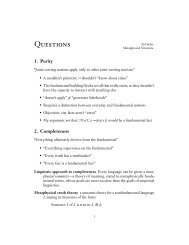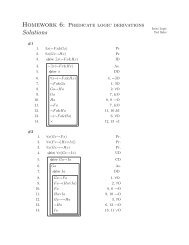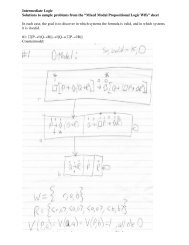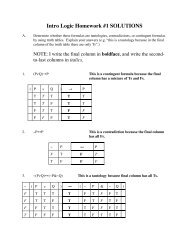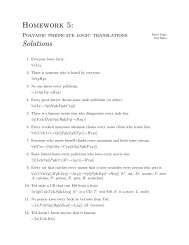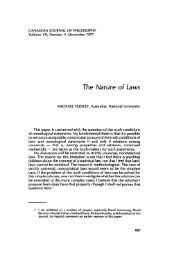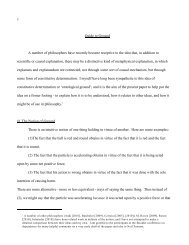Dummett - Wittgenstein's Philosophy of Mathematics.pdf - Ted Sider
Dummett - Wittgenstein's Philosophy of Mathematics.pdf - Ted Sider
Dummett - Wittgenstein's Philosophy of Mathematics.pdf - Ted Sider
Create successful ePaper yourself
Turn your PDF publications into a flip-book with our unique Google optimized e-Paper software.
MICHAEL DUMMETT<br />
from which the pro<strong>of</strong> starts, we have, as it were, no further<br />
active part to play; when the pro<strong>of</strong> is shown us, we are mere<br />
passive spectators. But in order to follow the pro<strong>of</strong>, we have to<br />
recognize various transitions as applications <strong>of</strong> the general rules<br />
<strong>of</strong> inference. Now even if these rules had been explicitly formulated<br />
at the start, and we had given our assent to them, our doing<br />
so would not in itself constitute recognition <strong>of</strong> each transition<br />
as a correct application <strong>of</strong> the rules. Once we have the pro<strong>of</strong>,<br />
we shall indeed say that anyone who does not accept it either<br />
cannot really have understood or cannot really have accepted<br />
the rules <strong>of</strong> inference; but it does not have to be the case that<br />
there was anything in what he said or did before he rejected<br />
the pro<strong>of</strong> which revealed such a misunderstanding or rejection<br />
<strong>of</strong> the rules <strong>of</strong> inference. Hence at each step we are free to choose<br />
to accept or reject the pro<strong>of</strong>; there is nothing in our formulation<br />
<strong>of</strong> the axioms and <strong>of</strong> the rules <strong>of</strong> inference, and nothing in our<br />
minds when we accepted these before the pro<strong>of</strong> was given, which<br />
<strong>of</strong> itself shows whether we shall accept the pro<strong>of</strong> or not; and<br />
hence there is nothing which forces us to accept the pro<strong>of</strong>. If<br />
we accept the pro<strong>of</strong>, we confer necessity on the theorem proved;<br />
we "put it in the archives" and will count nothing as telling<br />
against it. In doing this we are making a new decision, and not<br />
merely making explicit a decision we had already made implicitly.<br />
A natural reaction to this is to say that it is true enough when<br />
we have not formulated our principles <strong>of</strong> inference, or have<br />
formulated them only in an imprecise form, but that it does not<br />
apply at all when we have achieved a strict formalization.<br />
<strong>Wittgenstein's</strong> hostility to mathematical logic is great; he says<br />
that it has completely distorted the thinking <strong>of</strong> philosophers.5<br />
Because this remark as it stands is so plainly silly, it is difficult<br />
to get a clear view <strong>of</strong> the matter. Consider a favorite example<br />
<strong>of</strong> <strong>Wittgenstein's</strong>: you train someone to obey orders <strong>of</strong> the form<br />
"Add n" with examples taken from fairly small numbers, then<br />
give him the order "Add one" and find that he adds two for<br />
numbers from ioo to i99, three for numbers from 200 to 299,<br />
and so forth. Wittgenstein says that there need have been nothing<br />
5 IV, 48.<br />
330


